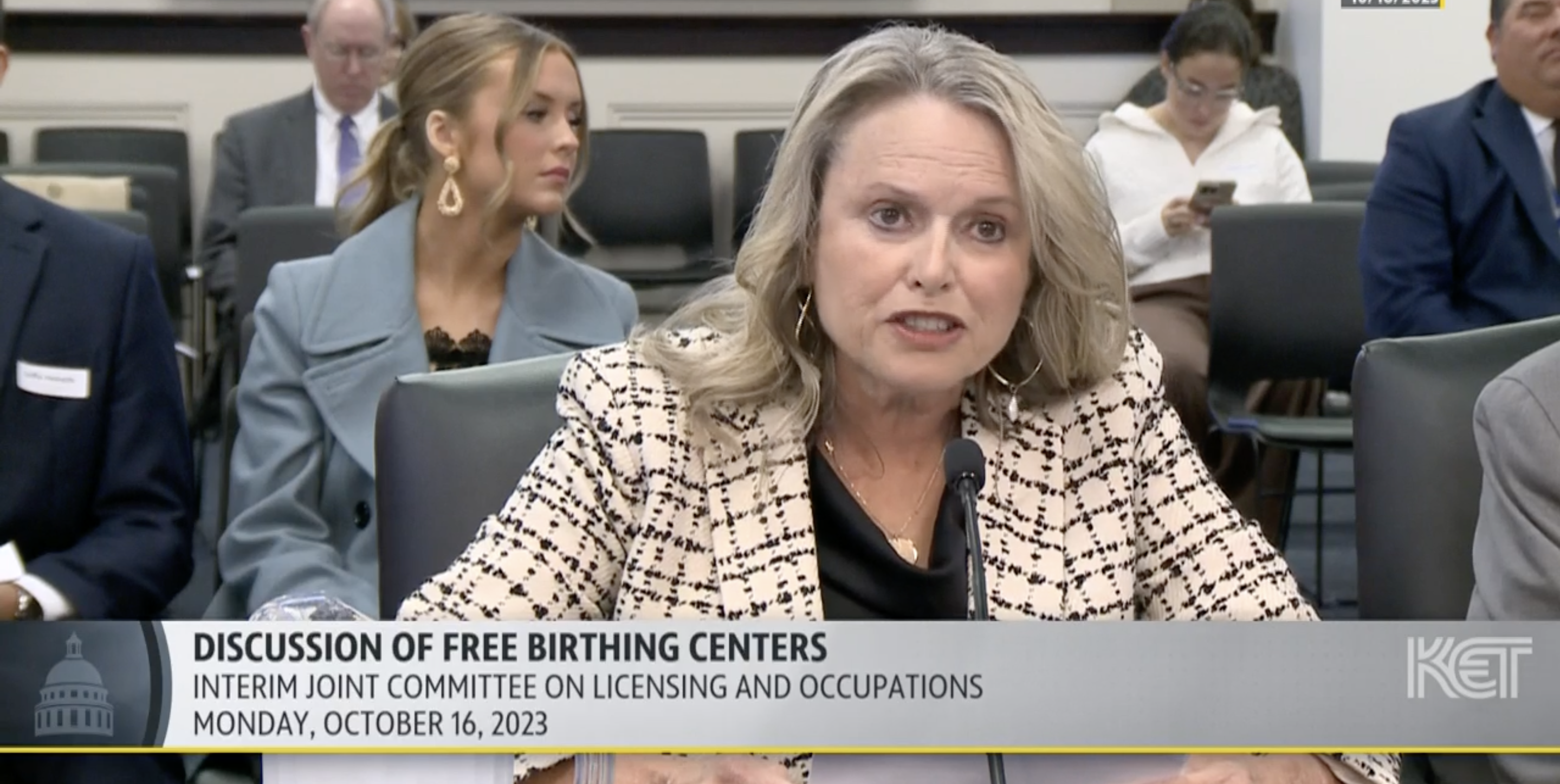Proponents of freestanding birthing centers say they have a better bill, but hospital association keeps lobbying against it

By Sarah Ladd, Kentucky Lantern
Two Kentucky legislators who have championed freestanding birth centers said Monday that they have agreed to concessions in their latest proposal, but the head of the state’s hospital association and two obstetrician-gynecologists testified that the changes are not enough to protect patients.
Advocates for each side of the years-long debate spoke Monday before the Interim Joint Committee on Licensing, Occupations, & Administrative Regulations, as Kentucky lawmakers consider changes in the state’s certificate-of-need law, which has been used to block the opening of freestanding birth centers.
Both sides agree on at least one point: Safety of the baby and the person giving birth is the most important consideration.
The Kentucky Hospital Association and two OB-GYNs testified that birth is unpredictable, and hospitals are best equipped to handle complications like hemorrhage.
The idea behind certificate-of-need laws is to limit health-care costs. Thirty-five states and Washington D.C. had such laws as of December 2021.
To obtain a certificate in Kentucky, a freestanding birth center would have to prove there is a lack of similar services. These facilities are home-like settings for low-risk births and do not offer services like surgery.
The existence of the requirement makes it nearly impossible to get centers in the state. Kentucky hasn’t had any since the 1980s, Mary Kathryn DeLodder, the director of the Kentucky Birth Coalition, testified previously.
Meanwhile, hundreds of Kentuckians seeking to give birth outside a hospital are traveling to neighboring states that have freestanding birth centers for the service.
A longtime sponsor of freestanding birthing center legislation, Rep. Jason Nemes, R-Louisville, told his colleagues that “over the years we’ve made a lot of improvements, a lot of changes” in proposals to satisfy the hospital association and The American College of Obstetricians and Gynecologists (ACOG).
Nemes testified alongside Sen. Shelley Funke Frommeyer, R-Alexandria, who sponsored legislation on the issue in the 2023 session, and DeLodder.
They told the committee that their new legislation would limit birth centers to four beds, include language to address the need for malpractice insurance, and unifying language that defines the centers across all state laws. The result, Funke Frommeyer said, will be a “very attractive” piece of legislation in 2024. But hurdles to a law passing remain.
Childbirth: ‘Normal until it’s not’
Going through labor and giving birth is “normal until it’s not,” said Dr. Dan Goulson, chairman of the physician leadership forum in the hospital association, the chief medical officer for the CHI St. Joseph’s Health System and a board-certified anesthesiologist.
“Once it’s not normal anymore, time is critical,” Goulson told lawmakers.
St. Elizabeth Healthcare obstetrician Dr. Allana Oak said she handles many transfer births in Northern Kentucky, and “Catastrophic things can happen during childbirth.”

She asked, “And in areas where there is limited access to care, do we really want to create legislation that can put a birthing center far from a birthing hospital because then you cannot deal with it in a timely fashion?”
Nancy Galvagni, president and CEO of the hospital association, said hemorrhage is a top problem that’s both unpredictable and not treatable at a birthing center.
“We feel that removing birthing centers from certificate of need and weakening the licensing standards would put women and babies at risk,” Galvagni argued. “This is really going to roll back decades of progress in maternal care.”
These witnesses said they’re not opposed to the freestanding birthing center model of care, but argued that such facilities should be covered by certificate of need laws, should have transfer agreements with hospitals, and an OB-GYN in a director’s position.
On the other hand, Nemes said, “In Kentucky, you can have a birth at home. A lot of the women who would be choosing this option would otherwise have them at home. So it’d be a more safe environment for that person.”
Committee Co-Chair Sen. John Schickel, R-Union, also seemed to lean into Nemes’ point.
“For me, it boils down to this,” Schickel said. “Is there anywhere geographically in Kentucky you’re not allowed to have a home birth?”
Oak’s answer: “No.”
“It’s not against the law to be high risk and deliver at home,” she said, adding that she wants mothers to have informed consent. “That’s a choice that every mother can make.”
Photo: Kentucky Hospital Association President Nancy Galvagni opposed the idea. (Image via Kentucky Lantern)
Recommended Posts

Kamala Harris needs a VP candidate. Could a governor fit the bill?
Fri, July 26, 2024
After cyber-attack on Jefferson County Clerk, Fayette counterpart discusses precautions
Fri, July 26, 2024
An eastern Kentucky animal shelter is swelling this summer
Fri, July 26, 2024